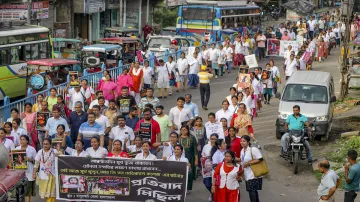Kolkata doctor rape, murder highlights misgovernance, lack of accountability: Eminent persons demand justice
Kolkata doctor rape-murder case: The eminent citizens also suggested conducting thorough investigations into the administrative heads of institutions to assess their role in ensuring the safety of their staff.

Kolkata doctor rape-murder case: The brutal rape and murder of a trainee doctor in Kolkata is a stark reminder of the deteriorating socio-cultural landscape and the grave threats faced by women in West Bengal, said a group of eminent persons, including former high court judges and ex-bureaucrats, today (August 21) as they demanded justice for the victim.
In a joint statement, they noted that while the incident highlights the prevailing "apathy, misgovernance and lack of accountability" in Kolkata, the capital of West Bengal, the state government's “apparent inclination” to shield perpetrators rather than protect victims is a “grave miscarriage of justice”.
“This is not an isolated event in West Bengal. A common picture emerges where for the last so many years the state has witnessed violence in many spheres of public life,” they said.
Right from the violence during the election period to the recent rapes, the law-and-order situation in the state needs serious introspection and immediate corrective measures are required, they said.
“It is time for action. We demand a safer, more just society for all women. We demand the state authorities of West Bengal to provide justice to our sister,” they added. The joint statement was signed by a total of 295 eminent personalities, which also included former police chiefs, ex-ambassadors and veterans.
Former chief justice of Sikkim High Court Permod Kohli, former chief election commissioner Sunil Arora, former defence secretary Dhanendra Kumar, former R&AW chief Sanjeev Tripathi, former ambassador Bhaswati Mukherjee and former secretary of the ministry of ports, shipping and waterways Gopal Krishna are among the signatories.
In the statement, they noted that initially, the horrific rape and murder of the trainee doctor at RG Kar Medical College, Kolkata, were "misclassified" as a suicide and the victim's parents were subjected to a distressing wait of several hours before being permitted to view their daughter's body. A rushed arrest was made soon after questions were raised about the thoroughness of the investigation, they added.
“This heinous crime is not merely a call for justice but also a desperate plea for immediate change. It is a wake-up call for the authorities to prioritise the safety and security of women of all castes and religions,” they said.
The state administration, including the police, have failed to demonstrate a genuine commitment to women and doctors' well-being, and their actions have raised serious concerns about their impartiality, they said.
“Alarmingly, construction work began just 20 meters from the crime scene within 24 hours of the incident, potentially compromising crucial evidence.
This action was one of several missteps by the authorities, creating significant obstacles to conducting a smooth and effective investigation,” they noted.
It took intervention from the Calcutta High Court to transfer the case to the Central Bureau of Investigation (CBI), finally paving the way for a more rigorous probe, they said. In the aftermath, as doctors engaged in a peaceful protest, a right guaranteed by the Constitution, they were violently attacked by a mob while the Kolkata Police stood by as silent spectators, with allegations surfacing that attempts were made to suppress the doctors' voices and conceal evidence, they added.
“This incident highlights the prevailing apathy, misgovernance and lack of accountability in Kolkata, the capital of West Bengal. The state's apparent inclination to shield perpetrators rather than protect victims is a grave miscarriage of justice,” they said.
Underlining that demoralization caused by the incident in Kolkata could have far-reaching consequences for the medical profession, they said it is crucial for the policymakers in West Bengal to take decisive action to restore confidence and ensure the safety of healthcare workers.
“Increase patrolling and security personnel in areas where doctors are on night duty. Provide separate and adequate washrooms for female and male doctors. Install functional intercom systems in doctors' rooms with emergency SOS features,” they said making a host of recommendations for the safety of doctors.
“Reassess and reform the entire system to address the systemic failures that contribute to such tragedies,” they added.